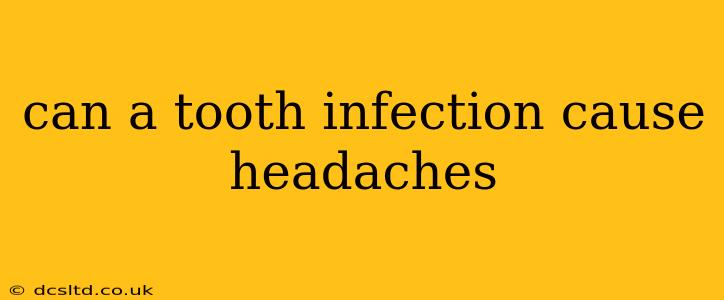Yes, a tooth infection, also known as an abscessed tooth or dental abscess, can absolutely cause headaches. The pain isn't just confined to your mouth; it can radiate and cause significant discomfort in other areas, including your head. This is because the infection can spread, impacting surrounding structures and triggering pain signals throughout the body. This article will delve deeper into the connection between tooth infections and headaches, exploring the causes, symptoms, and treatment options.
How Does a Tooth Infection Cause Headaches?
The primary reason a tooth infection can lead to headaches is the inflammation and pressure build-up caused by the infection. Bacteria invade the tooth's pulp (the soft tissue inside the tooth containing nerves and blood vessels), causing an infection that spreads to the surrounding tissues, including the jawbone. This inflammation can:
- Trigger nerve irritation: The inflamed tissues put pressure on nerves in the jaw and surrounding areas. These nerves are interconnected with those in the head, sending pain signals that are interpreted as a headache.
- Increase pressure in the sinuses: The proximity of upper teeth to the sinuses means that a severe infection can spread to the sinuses, causing sinusitis and associated headaches.
- Referred pain: The pain experienced from a tooth infection can be "referred" pain—meaning the pain originates in one area but is felt in another. The complex network of nerves in the head and face explains why a dental problem can manifest as a headache.
What Kind of Headaches Can a Tooth Infection Cause?
The type of headache associated with a tooth infection varies, but common presentations include:
- Tension headaches: These are often described as a tight band around the head, and are a common type associated with tooth infections due to the jaw muscle tension they can cause.
- Sinus headaches: If the infection spreads to the sinuses, you'll likely experience a pressure-like pain in your forehead, cheeks, or behind your eyes, characteristic of sinus headaches.
- Severe, throbbing pain: A severe throbbing pain, often localized on one side of the head, is common, reflecting the intensity of the infection.
What Other Symptoms Accompany a Tooth Infection Headache?
While headaches are a significant symptom, they rarely occur alone. Other symptoms that might indicate a tooth infection include:
- Severe toothache: Localized pain in the affected tooth, often worsening at night.
- Swelling in the gum: Noticeable redness and swelling around the infected tooth.
- Sensitivity to hot and cold: Increased sensitivity to temperature changes when consuming food or drinks.
- Fever: A sign that the body is fighting a bacterial infection.
- Pus: Visible pus discharge from the affected area.
- Difficulty opening your mouth (trismus): This indicates severe infection and inflammation.
- Bad breath (halitosis): A persistent foul smell in your breath, related to the infection.
How Are Tooth Infection Headaches Treated?
Treatment focuses on eliminating the infection and managing the pain. Typical approaches include:
- Root canal: This procedure cleans and seals the infected tooth pulp, saving the natural tooth.
- Extraction: If the infection is too severe or the tooth is beyond repair, extraction might be necessary.
- Antibiotics: Your dentist may prescribe antibiotics to combat the bacterial infection.
- Pain relievers: Over-the-counter pain relievers such as ibuprofen or acetaminophen can help manage the pain and inflammation.
How Can I Prevent Tooth Infections?
Preventing tooth infections involves good oral hygiene practices:
- Brushing: Brush your teeth twice a day with fluoride toothpaste.
- Flossing: Floss daily to remove food particles and plaque from between your teeth.
- Regular dental checkups: Visit your dentist for regular checkups and cleanings to identify and address problems early.
- Healthy diet: Limit sugary foods and drinks.
When Should I See a Dentist?
If you experience a headache along with other symptoms like toothache, swelling, or fever, seek immediate dental attention. Early intervention is crucial to prevent the infection from spreading and causing more severe complications. Delaying treatment can lead to serious health issues.
Can a Tooth Infection Cause a Migraine?
While a direct causal link between tooth infections and migraines isn't firmly established in all cases, the intense pain and inflammation associated with a severe tooth infection can trigger migraines in susceptible individuals. The inflammation and nerve irritation can disrupt normal brain function, leading to migraine onset.
This information is for general knowledge and does not constitute medical advice. Always consult a dentist or healthcare professional for diagnosis and treatment of any dental or medical condition.
